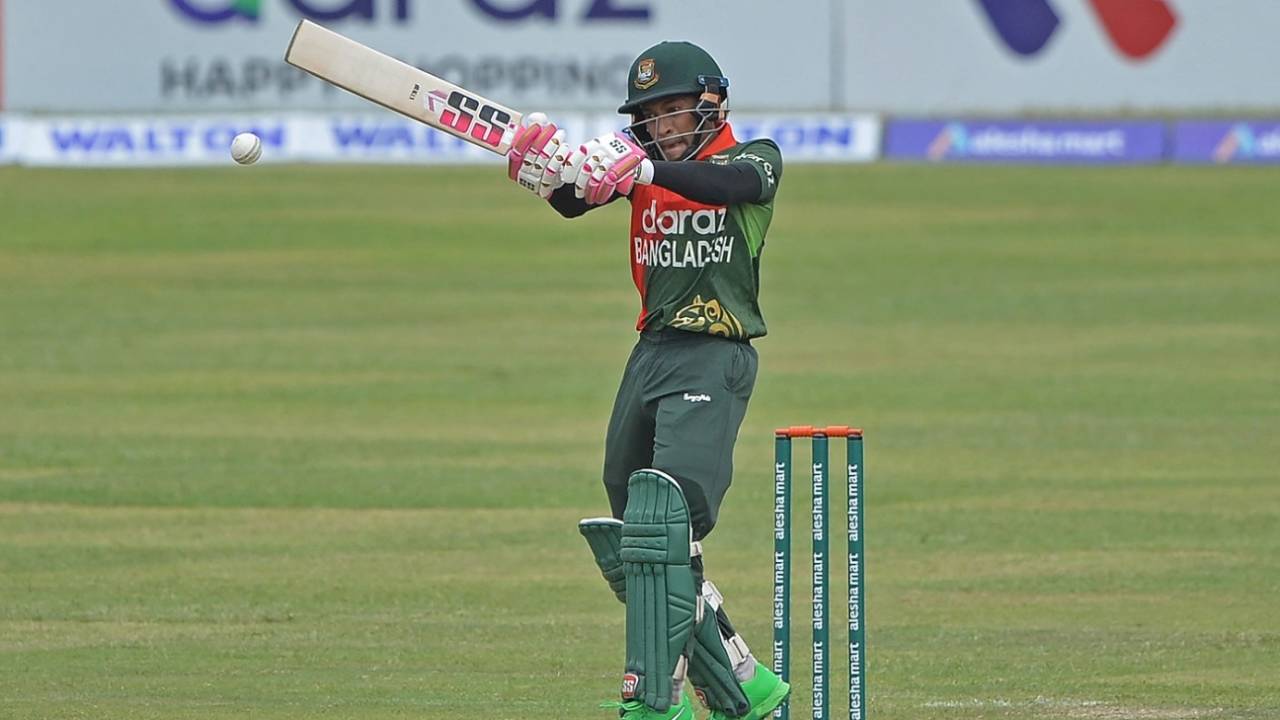Mental tweaks help Mushfiqur deliver consistency
How Bangladesh's plucky keeper-bat rescued a shaky innings to set up their series win
Mohammad Isam
25-May-2021
Mushfiqur Rahim has come up with two match-winning knocks this series • AFP/Getty Images
The talk around Dhaka for the last couple of days was about the cyclone brewing in the Bay of Bengal. There was heavy rain on the eve of the match, and plenty more was forecast during the second ODI on Tuesday. Mushfiqur Rahim was aware of his surroundings, and made a mental note of switching on and off, according to the interruptions.
An elite sportsperson will tell you when they are in that fabled "zone", few things can pull them out of it. It could be especially tough for someone who has spent more time in a bio-bubble than at home in the last eight months.
When the rain interrupted play for the first time, Rahim had to wait nearly half-an-hour on 84. Shortly afterwards when he moved to 96, there was a second downpour. Then, Bangladesh faced a difficult last 10 overs - they were already seven down with Rahim being the last recognised batter.
But he made his final 29 runs off just 16 balls to take the game away from Sri Lanka, who had Bangladesh on the mat at 184 for 7. Rahim went on to score 50 of the 62 runs Bangladesh made from that point.
"My main target was to bat for 50 overs, regardless of how much runs we get in the end," Rahim said. "I felt 246 was a fighting score on this wicket. The more important thing was that I was mentally prepared to switch on and switch off due to the weather. I am happy with the innings, but we missed out on the last eleven balls, and in a close contest, those 10-20 runs becomes crucial for us. I want to improve my batting more."
That it came during a rescue act - Bangladesh were 15 for 2 after losing Tamim Iqbal and Shakib Al Hasan - must have been more satisfying.
"We always try to lose fewer wickets in the first ten overs but I think it is quite normal to lose early wickets against the new ball," he said. "We always practice against the new ball, so it wasn't anything new for me. We looked to bat out the first five or six overs.
"There was more pace and bounce on the wicket than the first ODI. The ball was coming on to the bat. I told Liton (Das) that we can shift the momentum by playing to the merit of the ball for those early five to seven overs. We planned to get 20-odd runs at that stage. Liton was batting well but unfortunately got out."
Having spoken about how he approached his knock, Rahim then touched upon how he'd like the next crop of batters, like Das, Afif Hossain and Mosaddek Hossain to approach their innings. He underlined the need to be selective in their shot-making.
"I think if a team has seven or eight performers, the team will more often than not come out on top if they perform regularly," he said. "After Tamim and Shakib got out early, there was an opportunity for Liton, Afif and Mosaddek, who got a chance. They are trying but they have to be more selective. One has to know when to play a low-risk and when to play a high-risk shots on this type of wicket.
"I hope they become more matured, but I'd be pleased if they can quickly take a lesson from here. It makes things difficult when the pressure comes upon us in big and normal matches. If they start contributing, Bangladesh will become a stronger one-day team."
These batters don't have to go too far to find a playbook for such batting. They can have a look at the footage of Rahim's 84 and 125 in these two matches. Particularly in this innings, Rahim's wagon wheel was perfectly in tune with what was bowled at him, on a two-paced pitch, and the team's need.
He took singles and twos all around the wicket, but when it came to the boundaries, he understood where to hit hard and when to use the pace. He struck only three fours through the covers and one lofted hit down the ground. The rest came with tickles down third-man, a glide through fine-leg to reach his century, and using Dushmantha Chameera and Isuru Udana's pace to paddle sweep fours through backward square-leg.
"Like every century, this too is a special innings if the team wins," he said. "It contributed to our first ODI series win over Sri Lanka, so it will inspire me to do better in the coming days."
Rahim however is known for being straightforward, and he didn't let the chance to pass to talk about his reverse sweep, which garnered some attention after he got out playing the shot in the first game. He didn't play a single one in the second ODI, but promised there will be more reverse sweeps coming up.
"The reverse sweep is one of my favourite shots, and one of my go-to shots. If the situation arises, I can play four or five reverse sweeps, not just one."
Mohammad Isam is ESPNcricinfo's Bangladesh correspondent. @isam84
